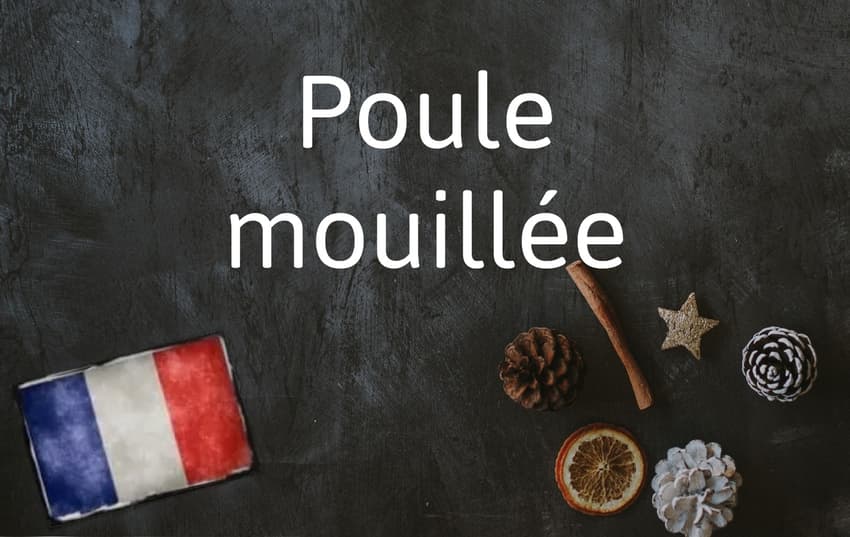French expression of the day: Poule mouillée

With a touch of the schoolyard about it, this is a particularly good French insult that is safe for both work and play.
Why do I need to know poule mouillée?
If you have children in French school they may well be flinging this around the playground, but its a good one for adults if they want a quite specific insult.
What does it mean?
Une poule mouillée - roughly pronounced as oon-pool-moo-yay - literally translates as 'wet hen' but it is really a slang term for coward, wimp, cissy or lily-livered poltroon (although we will admit that last one hasn't been heard around our way since the 18th century).
It's perhaps slightly childish, but it's widely used and will come in handy if you want to accuse someone of being cowardly.
So if your French friend is looking a bit shifty as the time approaches to go abseiling, you could tell him - Arrête d'être une poule mouillée et fais-le! Stop being such a wimp and do it!
Or when you're heading to the outdoor pool in February you could issue the challenge - Le dernier est une poule mouillée! - Last one in is a chicken!
Does it have any other uses?
In French une poule is a hen or chicken, while poulet refers to the meat of a chicken, so is more usually seen on menus.
As well as being used to signifying cowardice, you might also hear une poule used to refer to a woman. Probably not one to roll out at the feminist society meeting, it is roughly equivalent to calling a woman a 'chick' in English.
It can also be used as a term of endearment for children or close family members, as in ça va, ma poule ? You OK, honey?
Another use for this term that we would strongly recommend that you don't use - but you might want to learn to recognise - is as a slang term for the police. In the same way that certain sections of British society refer to the police as 'pigs' French officers are sometimes referred to as les poulets.
The origin of the term is not particularly derogatory - is is believed to come from a time when the Paris police were headquartered on the site of a former poultry market. However these days it is definitely a term of abuse, and not one we would recommend using in front of a French police officer unless you are feeling particularly foolhardy.
Any other options for wimps?
If you want to mock someone for their cowardice French has a few choices including une mauviette or un froussad.
If you want to be a little more formal in your judgements un lâche is a coward and cowardly behaviour is comportement lâche.
Comments (1)
See Also
Why do I need to know poule mouillée?
If you have children in French school they may well be flinging this around the playground, but its a good one for adults if they want a quite specific insult.
What does it mean?
Une poule mouillée - roughly pronounced as oon-pool-moo-yay - literally translates as 'wet hen' but it is really a slang term for coward, wimp, cissy or lily-livered poltroon (although we will admit that last one hasn't been heard around our way since the 18th century).
It's perhaps slightly childish, but it's widely used and will come in handy if you want to accuse someone of being cowardly.
So if your French friend is looking a bit shifty as the time approaches to go abseiling, you could tell him - Arrête d'être une poule mouillée et fais-le! Stop being such a wimp and do it!
Or when you're heading to the outdoor pool in February you could issue the challenge - Le dernier est une poule mouillée! - Last one in is a chicken!
Does it have any other uses?
In French une poule is a hen or chicken, while poulet refers to the meat of a chicken, so is more usually seen on menus.
As well as being used to signifying cowardice, you might also hear une poule used to refer to a woman. Probably not one to roll out at the feminist society meeting, it is roughly equivalent to calling a woman a 'chick' in English.
It can also be used as a term of endearment for children or close family members, as in ça va, ma poule ? You OK, honey?
Another use for this term that we would strongly recommend that you don't use - but you might want to learn to recognise - is as a slang term for the police. In the same way that certain sections of British society refer to the police as 'pigs' French officers are sometimes referred to as les poulets.
The origin of the term is not particularly derogatory - is is believed to come from a time when the Paris police were headquartered on the site of a former poultry market. However these days it is definitely a term of abuse, and not one we would recommend using in front of a French police officer unless you are feeling particularly foolhardy.
Any other options for wimps?
If you want to mock someone for their cowardice French has a few choices including une mauviette or un froussad.
If you want to be a little more formal in your judgements un lâche is a coward and cowardly behaviour is comportement lâche.
Join the conversation in our comments section below. Share your own views and experience and if you have a question or suggestion for our journalists then email us at [email protected].
Please keep comments civil, constructive and on topic – and make sure to read our terms of use before getting involved.
Please log in here to leave a comment.